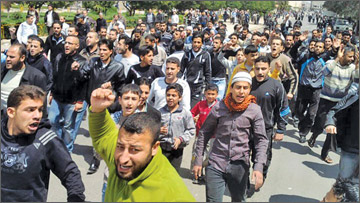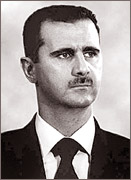Seeds of today’s political crisis in Syria
Latheef Farook
Peaceful demonstrations demanding political
reforms and dignity now rage throughout Syria threatening to bring down
President Bashar Al Assad’s minority Alawite rule. In his drive to crush
the demonstrators by his traditionally scorched earth policy Asad has
killed so far more than 890 peaceful demonstrators. It appears Assad has
gone too far and indications are that demonstrations are likely to
continue until he is toppled as people begin to sacrifice their lives
for freedom.
|

Syrian protesters demand political reforms. Picture courtesy:
Google
|
Today’s Syria was part of Turkey’s Ottoman Empire province since
1516. It was created in 1918, after defeating Turkey in the World War 1,
and brought under French colonial rule by Britain and France when the
two carved out the Middle East.
Since then France played havoc with Syria pitting one sectarian group
against the other under its divide and rule policy. France sowed seeds
for today’s conflicts in Syria by placing in power around six percent
Alawites, an offshoot of Shia sect and ignored and sidelined around 75
percent Sunni Muslims.
Security services
By the time of independent in 1946 Alawites were in control of the
government sector and armed forces. Sunnis continued to suffer in
silence and humiliation subjected to arrest, torture and killing in
secret cells.
|

President Bashar
al-Assad |
In the November 1970 military coup Alawite Hafiz Al Assad captured
power. He adopted Arab Baath Socialism-secular cover to justify minority
Alawite rule over Sunni majority. He brought in Alawite clan into key
positions, particularly in the armed forces, security services,
government bureaucracy and consolidated his rule. He used 15 different
security services and rigid state control of the media and all forms of
communications.
Thus since 1970 Syria has been under ruthless tyranny. Repeated Sunni
uprisings for political rights were crushed with iron fist under Hafiz’s
scorched earth policy.
This situation continued until the political uprising raging Middle
East and North Africa triggered after the unemployed Tunisian graduate
Mohamed Bouazizi committed suicide in Tunis on December 17, 2010.
These protests spread to Syria too. The long brutalized people came
out on modest peaceful demonstrations since January 26, 2011 in the
Sunni majority city of Deraa, seeking the removal of draconian emergency
laws, end arbitrary arrests, torture and killing and political reforms
to ensure dignity.
As days and weeks passed these demonstrations spread to rest of the
country especially after Hasan Ali Akleh from Al-Hasakah set himself on
fire on January 26, 2011 to protest against government oppression.
Political uprising
Initially people wanted reforms. However after senseless massacres
cries for vengeance intersected with calls for the regime’s removal,
marking a potentially dangerous new dynamic in the peaceful political
uprising. Hafiz Al Assad dispatched troops to Lebanon in 1976 to protect
Palestinian refugees from Israeli backed Christian Falangists.
Instead, under a de facto alliance with Israel, Hafiz allowed
Falangists to besiege Palestinian camps of Karantina and Tel al Zaatar
where an estimated 30,000 Palestinians were killed and an equal number
injured.
Sunnis, from the very inception, rejected the secular Bath socialism
and objected to rule by the Alawites whom they consider heretical.
These agitations culminated in an uprising in February 1982 in the
city of Hama where Assad’s troops committed one of the worst massacres
known in the entire region. He destroyed mosques, churches, hospitals,
schools and houses, centres of heritage of the city followed by similar
massacres in other cities of Syria. Since then people in general have
been terrified of their rulers and the security states have really
marginalized them and demolished their sense of dignity.
The Syrian regime also committed several massacres in different
places such as Jisr Alshaghoor, Mashariqah neighborhood on the morning
of Eid Al-Adha, and Al-Raqah where tens of citizens who were held
captive in a secondary school and burnt to death. Most of them killed
were women, children and elderly.
Champions of human rights
Hafiz Al-Asad died on June 10, 2000, and was succeeded by his son;
Bashar Al-Assad who made many promises of political reforms but never
fulfilled any. He has done little to loosen his Baath Party’s tight
control of the country. In an interview with Wall Street Journal on
January 31, 2011, Bashar said that “it was time to reform. A ‘new era’
is coming to the Middle East and that Arab rulers need to do more to
accommodate their peoples’ rising political and economic aspirations”.
He knows that so called champions of human rights in Washington,
London and Paris would do nothing other than mere verbal condemnation to
hoodwink the world. The reason being Assad family and his Alawites have
been great assets to Israel unlike Sunnis who would question and resist
Israeli atrocities.
The question is whether Bashar would be able to survive under the
fast changing political scene in the region. |



